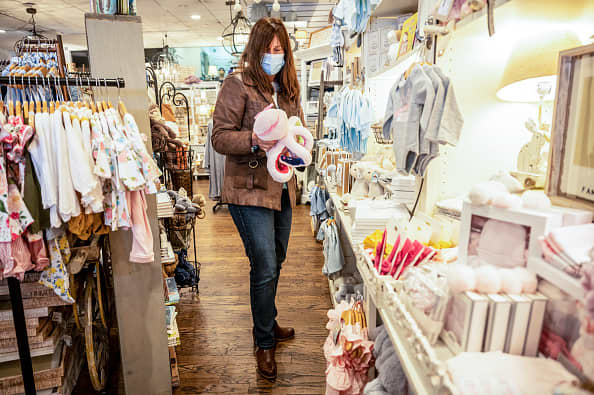
A woman wears a face mask while shopping for a baby shower gift during the Covid-19 pandemic, at Madison’s Niche boutique in Huntington, New York on April 21, 2021.
Alejandra Villa Loarca | Newsday | Getty Images
A millennial-fueled baby boom appears on its way and could lift sales for retailers, including Target, Walmart and Costco, according to a note published Tuesday by Bank of America.
Birth rates are up, more pregnancy tests are being sold, and more couples say they are trying to have a baby, the company’s research shows.
That could spell good news for grocers, big-box stores and warehouse clubs that sell diapers, strollers and other baby merchandise — or are simply located closer to suburban homes where new parents may settle, according to Robby Ohmes, a equity research analyst. He predicted the baby boom could start this year. Among the beneficiaries, he called out Albertsons, Kroger, Dollar General and BJ’s Wholesale Club.
Millennials have surpassed baby boomers to become the largest generation in the country, according to the U.S. Census Bureau. The group — made up of roughly 72.1 million people — ranges in age from 25 to 40, according to the Pew Research Center.
One of the leading indicators of the potential “millennial baby boom” is elevated sales of pregnancy tests. Sales of pregnancy tests have grown by an average of 13% year over year since June 2020, according to data from Nielsen and research by Bank of America. This compares with an average of up 2% year over year from 2016 to 2019.
If this plays out, it would reverse a decline in births during the pandemic. Live births increased 3.3% in June 2021, the highest level of growth seen since 2013, according to Bank of America research.
In a monthly survey by the company, 11.3% of respondents said they or their partner are expecting or trying to have a baby over the next 12 month period. That survey was conducted in October with approximately 1,000 people. It marked an all-time high since Bank of America launched the survey in December 2020.
Some retailers have already credited millennials — and their upswing in marriages, babies and home purchases — for driving more sales. Best Buy said the generation has become its biggest cohort of customers. Home improvement retailers Home Depot and Lowe’s have said that generational trends — not just pandemic-induced nesting — are powering the companies’ strong sales.




